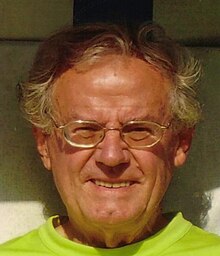Karl-Heinz Reinfandt
Karl-Heinz Reinfandt (born July 7, 1932 in Danzig ) is a German musicologist and music teacher in Kiel.
biography
Karl-Heinz Reinfandt studied from 1953 to 1955 at the University of Education in Flensburg (music and German). He then worked at various elementary and secondary schools as well as secondary schools in Schleswig-Holstein. In 1958 he took up another course of study, this time in school and church music at the Hamburg University of Music and the subjects of musicology, literature and education at the universities in Hamburg and Kiel, which he completed with a doctorate in 1966 (“The relationship between text and voice genre in of German Protestant church music of the Baroque period ”; Supervisor: Kurt Gudewill ). From 1963 to 1968 he returned to teaching at various high schools in Kiel and Wyk auf Föhr.
At the same time, Karl-Heinz Reinfandt remained closely associated with the University of Education in Kiel: After teaching singing from 1963 to 1966, he took up a lectureship in music and its didactics there from 1968 to 1971. 1971 took place call for a professorship ( C3 ) for music didactics and musicology at the University of Education Kiel , in 1983 the call (C4) up there to the director of the Institute. After the transition from the University of Education to the Christian Albrechts University in Kiel , Karl-Heinz Reinfandt became director of the Institute for Aesthetic Education at the University of Kiel. From 1995 until his retirement in 1997, Karl-Heinz Reinfandt also held visiting professorships at the Rostock University of Music and Theater and at the University of Flensburg .
Karl-Heinz Reinfandt is the father of the English scholar Christoph Reinfandt .
Teaching and teaching activities
In addition to teaching and research at the University of Education in Kiel and the University of Kiel, Karl-Heinz Reinfandt has also been active as a music teacher in public since the 1970s. In the context of family and adult education, he has mainly been involved in adult education since retiring in 1997 (he currently teaches as part of the "contact studies according to work and family" at the University of Kiel and gives regular lectures for the Schleswig-Holstein University Society ).
Karl-Heinz Reinfandt is a co-founder of the State Music Council in Schleswig-Holstein and a member of the board of the working group Music in Young People (AMJ). In addition, he has distinguished himself since the 1970s through intensive work as a choir and orchestra conductor (German-Scandinavian Music Weeks in Schleswig-Holstein; Europa Cantat) and as a cantor and organist. A special focus in the 1980s were the annual family music weeks he initiated and directed, which took place at the Heimvolkshochschule (now: Nordsee Akademie ) in Leck ( Schleswig-Holstein ) until 1991 .
Research priorities
- Curricular reform of music teaching
- Music education in the extracurricular area
- Didactics of New Music
- Continuing education for adults
Fonts
- The youth music movement. Impulse and Effects (ed.), Wolfenbüttel 1987.
- “Active participation in music” as an educational mandate. On practice - reference and implementation of Jöde's reform concept in music lessons, in: Youth Movements and Music Education, Report of the meeting of the Scientific Society for Music Education, ed. by Sigrid Abel-Struth, Mainz 1987, pp. 111-133.
- Fritz Jöde's work during the Third Reich, in: Fritz Jöde - A contribution to the history of music education in the 20th century, ed. by Hildegard Krützfeldt - Junker, (Music in Discourse 5), Regensburg 1988, pp. 115–130.
- Music in parenting and family education, using the example of Schleswig-Holstein, in: Musical adult education, basic features - developments, perspectives, ed. by Gerd Holtmeyer, Regensburg 1989, pp. 237-244.
- Why do we sing in class? Outlines of a future singing didactics, in: Aspects of contemporary music pedagogy. A subject in upheaval, ed. by Wulf Dieter Lugert and Volker Schütz, Stuttgart 1991, pp. 149–158.
- Lifeworld and singing lessons as a subject of research, in: Music pedagogical research reports 1994. ed. by Heiner Gembris u. a., Augsburg 1995, (Forum Musikpädagogik 13), pp. 187–193.
- Despair and hope. Arnold Schönberg: “A survivor from Warsaw”, in: Musikvermittlung, ed. by Reinhard Schneider, (Music in Discourse 11), Regensburg 1995, pp. 117–126.
- Art and aesthetic education in the modern world - we need a new aesthetic, in: Aesthetics in cultural education, Remscheid 1997, (series of publications by the Federal Association for Cultural Youth Education 41), pp. 59–65.
- On the claim to art of atonal music, in: Systematic Music Pedagogy, ed. by Martin Pfeffer u. a., (Forum Musikpädagogik 34), Augsburg 1998, pp. 451-460.
- Friends of Music Association. A concert life in Kiel. Together with Selke Harten-Strehk and Oliver Kopf, ed. by Wolfgang Schmöe, Kiel 2001.
- “Can only be said through tones”: To convey the truth of Anton Webern's “Six Pieces for Orchestra op. 6”, in: In terms of music education. Aspects and Positions, ed. by Stephan Hörmann u. a., Frankfurt am Main 2003, pp. 317–327.
Web links
- Literature by and about Karl-Heinz Reinfandt in the catalog of the German National Library
| personal data | |
|---|---|
| SURNAME | Reinfandt, Karl-Heinz |
| BRIEF DESCRIPTION | German musicologist and music teacher |
| DATE OF BIRTH | July 7, 1932 |
| PLACE OF BIRTH | Danzig |
